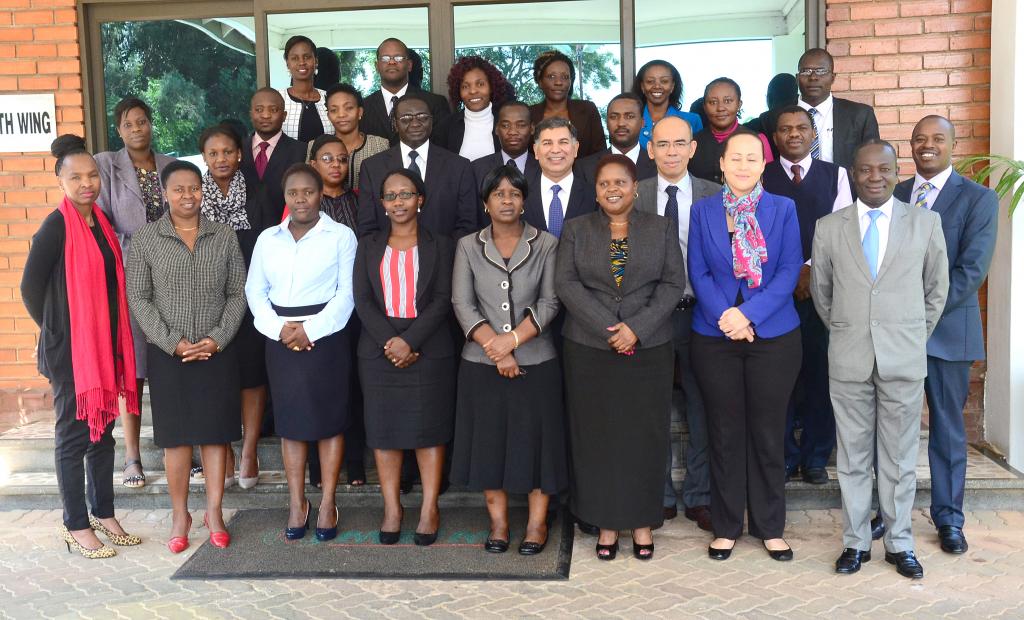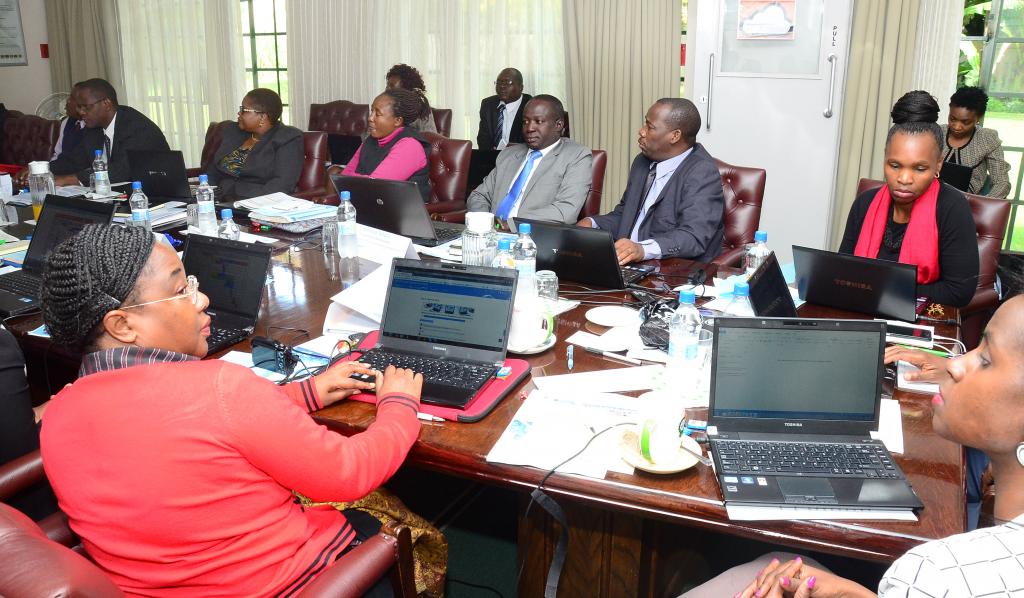UNITAR Completes the Training Phase of the MEFMI Partnership
 6 May 2015, Geneva, Switzerland – UNITAR and the Macroeconomic and Financial Management Institute of Eastern and Southern Africa (MEFMI) recently concluded the Phase 1 of their joint collaboration to strengthen MEFMI’s capacity to develop and deliver e-Learning courses.
6 May 2015, Geneva, Switzerland – UNITAR and the Macroeconomic and Financial Management Institute of Eastern and Southern Africa (MEFMI) recently concluded the Phase 1 of their joint collaboration to strengthen MEFMI’s capacity to develop and deliver e-Learning courses.
Phase 1 - which is a training for MEFMI staff on e-Learning, quality standards, methodologies, and delivery - was conducted by UNITAR at the MEFMI Secretariat in Harare, Zimbabwe from April 13 to 17, 2015.
The training was attended by 27 MEFMI staff including Programme/Finance & Administration Directors and Officers, Technical Team, Communication and Support Staff. It was officially opened by the Director for Finance and Administration, Ms Rose Malila-Phiri on behalf of the MEFMI Executive Director Dr Caleb Fundanga. In her opening remarks, she stated that “the major reason for moving towards e-Learning was not to disband the traditional modes of delivering the MEFMI courses, but to complement the product and service offering to MEFMI clients.”
Delivering online training has been identified by MEFMI as a strategic approach to expand its outreach and optimizing its resources to ensure quality, sustainable and just-in-time training to its beneficiaries from 15 member countries in Eastern and Southern Africa namely Angola, Botswana, Burundi, Kenya, Lesotho, Malawi, Mozambique, Namibia, Rwanda, Swaziland, Tanzania, Uganda, Zambia and Zimbabwe.
Currently, MEFMI carries out training events through regional workshops and seminars, country missions and in-country workshops.
Knowledge Transfer
The training was designed to maximize knowledge transfer by empowering the MEFMI staff to develop action plans in order to transition from Phase 1 to Phases 2 and 3. This was achieved by imbedding theoretical presentations during the training as well as hands-on exercises, job aid templates and round-table discussions in order to understand the concepts and practical solutions that allow MEFMI to design the next steps to achieve its e-Learning objectives that fits its overall work plan.
The knowledge transfer focused on four key e-Learning areas requested by the MEFMI staff in the pre-training needs survey, namely (a) implementing a MEFMI Quality Assurance Guidelines, (b) understanding content development and delivery/roll-out, (c) operationalizing an e-Learning Programme, and (d) transitioning from Phase 1 to Phases 2 and 3 of the partnership project.
A MEFMI staff commented that “the training took into consideration all the participants’ needs and role and that it was designed in a very basic and clear format such that those of us with little computer skills could follow.” Others appreciated the hands-on and design of the training by saying “the training was hands-on providing practical experience with the LMS, the round-table discussions were very useful.”
Phases 2 and 3
Following the completion of Phase 1, UNITAR and MEFMI are now shifting to the implementation phase of the action plans to deliver the six online courses (Phase 2) based on the way forward that were outlined by each Programme. This will be coordinated by UNITAR with the assigned focal points for each of the upcoming six courses.
The three MEFMI Programmes, namely the Debt Management Programme, the Macroeconomic Management Programme, and the Financial Sector Management Programme will deliver at least six online courses in the next 12 months covering the topics on Legal and Institutional Framework for Public Debt Management, Financial Negotiation Skills and Techniques, Introduction to Balance of Payments, Introduction to Modelling and Forecasting, Introduction to Public Finance Management, Fundamentals of Microfinance Supervision, and Fundamentals of Financial Markets.
The MEFMI Technical Team also presented Phase 3 of the partnership which is the operationalizing and customization of the MEFMI Learning Management System (LMS). Accordingly, the technical infrastructure to support MEFMI’s e-Learning Programme is also progressing well and on schedule.
Phases 2 and 3 will be fully completed by June 30, 2016.
Comments and Statistics
 Overall, the results of Phase 1 (training) have been positive. Based on the survey results, the participants appreciated the approach taken in designing Phase 1 by integrating the skills-building exercises (needed for the next steps of the project) into the training activities.
Overall, the results of Phase 1 (training) have been positive. Based on the survey results, the participants appreciated the approach taken in designing Phase 1 by integrating the skills-building exercises (needed for the next steps of the project) into the training activities.
One MEFMI Programme Officer commented that the training “demystified the subject of e-Learning from an administrator’s point of view. My fears from the start were laid to rest. It built confidence in my abilities to attempt developing and administering courses using the e-Learning platform.”
“The round-table discussions, practical use of the UNITAR e-Learning platform, the structuring of the round-table discussions on a daily format was quite innovative” was a similar comment from another MEFMI Programme Officer.
Other positive feedback received include: “the training was hands-on providing practical experience with the Learning Management System, round-table discussions were very useful, presentations were lively and interesting, the theoretical aspects of the course were particularly helpful - they helped me appreciate salient aspects of e-Learning that I would have otherwise neglected, the training was an eye opener as I have never done an e-Learning course before - presentations were detailed and facilitators really did their best.”
Survey results also reinforced the positive feedback, as follows:
- 100% (25 staff) of the respondents agree or strongly agree that the methodology was useful given the learning objectives.
- 100% (25 staff) of the respondents agree or strongly agree that the training facilitators were effective in presenting information.
- 96% (24 out of 25 staff) of the respondents agree or strongly agree that the training facilitators were effective in responding to questions of participants.
- 96% (24 out of 25 staff) of the respondents agree or strongly agree that the training facilitators were effective in stimulating participant involvement.
- 96% (24 out of 25 staff) of the respondents agree or strongly agree that the organizational support provided by MEFMI and UNITAR are satisfactory.
- 100% (25 staff) of the respondents agree or strongly agree that the training materials were sufficient.
- 92% (23 out of 25 staff) of the respondents agree or strongly agree that the overall training was satisfactory.
- 96% (24 out of 25 staff) of the respondents agree or strongly agree that the training can be recommended to a colleague.
The on-going successful collaboration between MEFMI and UNITAR did not come as a surprise. MEFMI and UNITAR have a long standing collaboration in providing capacity development activities in Eastern and Southern Africa with the first joint training activity delivered back in 1999.
Related Links
For more information about MEFMI, please see www.mefmi.org
For more information about UNITAR’s Public Finance and Trade Programme, please see www.unitar.org/pft
Photo: MEFMI Staff and Training Facilitators, taken at the MEFMI Secretariat on April 16, 2015.
Photo credits: MEFMI

